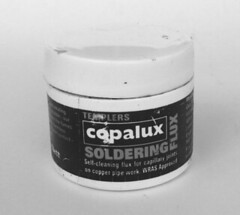Tom asked, “What do you use for flux, and where do you get it?”
When soldering you are supposed to use a “proper” liquid flux – at least according to all the books on the subject. However it’s never available when I want some and besides I’ve never found it necessary.
Currently I’m using Templers Copalux flux bought from a DIY store. It’s a paste flux that seems to do the job nicely. It’s wise to clean it off the piece after soldering – use “Shiny Sinks” from a hardware store or the cleaning isle of Tesco. I have left a couple of test pieces uncleaned for a few weeks and nothing has gone green. Mind you, it has the consistency of Vasaline so I doubt paint would stick to it very well !
The picture is black & white because I’ve wruiten a review of solders for the DOGA newsletter and I’ve lost the colour version.
“Any top tips for a complete beginner?”
Make sure the metal you are soldering is clean. If I’m not sure I rub it with a fibreglass pencil to make sure it shines.
Don’t try and solder big lumps of metal together – or at least not in your first days with the iron. The metal will suck heat away from the join. Practise on spare bits of fret or thin strips from the K&S rack.
If you use lead-free solder. Make sure it is the sort with a small amount of silver in it. Maplin sell something suitable for £2.49 for 4m
Hope this helps. If anyone has any more questions – feel free to e-mail me
A daily updated blog typed by someone with painty hands, oil under his fingernails and the smell of solder in his nostrils who likes making all sort of models and miniatures. And fixing things.
Monday, June 12, 2006
Flux
Labels:
kitbuilding,
materials,
model railway
Subscribe to:
Post Comments (Atom)

1 comment:
Thanks :) I'll give it a go hopefully at the weekend.
Post a Comment